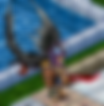Pet Tamer's Handbook
Vulture
Seeing a group of vultures, or a kettle, circling in the sky has always been a sign that death is close by. Vultures are mostly recognizable as scavenger birds with long, feathered wings, a bald head and neck, and a sharp curved beak. Vultures are vicious, nasty birds that will eat just about anything they can find.
They primarily eat carrion, dead and decaying flesh. Vultures prefer fresh meat, but can digest food that has decayed to a point that most creatures cannot eat safely. They will also fight other predators to gain access to a fresh kill. Vultures are relatively social animals that do not usually fly or feed alone. When a group of vultures, also known as a community or volt, eats together, they are usually referred to as a wake.

Capturing a Vulture
It is very unlikely that you will be able to capture a healthy adult vulture in the wild. You will have much better luck scouting for a vulture that has been injured and cannot fly well, if at all. Even if the vulture cannot fly, it can still run, so be prepared to go on a chase.
Corner the vulture, using linen to block it from escaping. This is particularly effective if another aisiling is assisting you, allowing you to corral the bird into a corner, and eventually into the container you plan to transport it home in. It is preferable to use a basket or box that is small, to keep the vulture calm and prevent it from moving around and injuring itself.
Also be aware that the vulture will likely vomit when you first attempt to catch it; this is done as a form of defense, to distract the predator as well as to lighten the stomach for better take-off.
Other Facts
Vultures have a wide variety of names including a kettle, wake, committee, volt, or venue.
Although mundanes have been blaming vultures for many deochs, they do not hunt healthy livestock. In fact, vultures seldom attack living creatures, unless provoked.
Most vultures have a keen sense of smell and are good at digging.

Other Methods of Obtaining a Vulture
Vultures can be difficult pets to breed for the purpose of raising their young, because they only lay one to three eggs every twelve deoches or so. Vultures need to be left alone (away from aisling or mundane interaction) in a space large enough for the vultures to fly, as their mating ritual involves the male vulture flying after the female vulture in a courtship dance. Vultures do not make nests, and both parents incubate the eggs.
Baby vultures are very vulnerable and rely on both parents to feed them by regurgitating food. Therefore, it is highly recommended that you leave the chicks with their parents until they are old enough to fly and scavenge food for themselves.
Although vultures are not a rare creature, nor particularily difficult to catch, a wild one does not make for a good pet; wild vultures carry many parisites on their stiff feathers. If you are looking for a quality bird, it is best to obtain them from a breeder who raised the animal out of the wild.
They can legally be purchased and kept in most towns ((for 290 Kruna in the Item Shop)).
Caring for Your Vulture
Vultures are very messy, destructive pets; they will poop as they walk, urinate on their own feet (to keep them moist and cool), and they are prone to attacking just about anything they think they may be able to eat, or that they feel threatened by. Always keep your pet vulture away from other, smaller pets.
If you want your vulture to be able to remain with flight, they will need a lot of space; having a field where the vulture is free to fly is almost essential. Just be sure to keep it on a thin metal chain around a leg, so your new pet doesn't just fly – or run – off.
If you plan to keep your vulture indoors, feed it only recently killed carcasses of small animals, such as rats. Otherwise, your pet vulture can travel with you, cleaning up your hunts.

